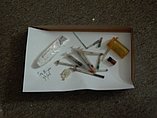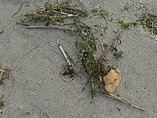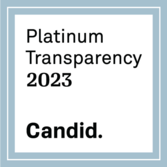Clean Ocean Advocate, August 2004
7-MILE GARBAGE SLICK HITS BEACHES


Northern Monmouth County Awash in Debris
Plan to Prevent Slicks Fails; Elected Officials Call for Action
The afternoon of July 7, COA received a telephone call from an outraged Fair Haven, NJ, citizen, who was exercising on the public beach in Sea Bright and observed large amounts of plastics and lumber on the beach and floating in the water, and one syringe. COA reported the incident to the New Jersey Department of Environmental Protection (NJDEP) and went to the scene to investigate. Indeed, debris, including plastic tampon applicators, condoms, and grease balls, lined the tide line as far as the eye could see, north and south. Within two hours, nine syringes, some with needles attached, were picked up on a half-mile of the Sea Bright beach, among other debris.
According to conversations with NJDEP that evening, the department knew about a 7-mile garbage slick offshore that afternoon and was monitoring it. The slick washed ashore after a wind shift to the east-southeast.
This incident follows many other similar wash-ups on NJ’s beaches this year and in 2003. The source of this wash-up was determined by officials to be the combined sewers of north Jersey and New York City. The heavy rains earlier that week, combined with the increased activity in and around the region on 4th of July weekend, flushed the combined sewers (which includes sanitary waste and stormwater runoff) into New York Harbor and out into the ocean.
Plan Breaks Down
A NY/NJ Floatables Action Plan, an inter-agency effort to prevent floatables or debris from getting into the open ocean from the Hudson-Raritan Estuary (including the Harbor), was developed and implemented in 1989. This wash-up, in addition to the previous incidents, is evidence that the Plan failed or has broken down.
US Representative Frank Pallone (D-6) sent a letter to the US Environmental Protection Agency (EPA) and the US Army Corps of Engineers (ACE), two of the several agencies party to the plan, stating, "I am greatly disturbed that your agencies did not immediately spring into action...to ensure that the garbage was contained and removed from the New York/New Jersey harbor before it reached the Atlantic Ocean."
In response, EPA and ACE officials revisited the plan to determine ways to improve it. The plan now has renewed communication procedures between agencies and scheduled daily coverage with vessels. The agencies plan to review surveillance and response efforts.
NJ Assemblyman Sean Kean (R-11) also raised questions about the response and lack of clear information from NJDEP about the known slick. To date, the State of NJ has not responded to his request for clarification and information.
Attention Citizens -- If You See It, Report It
This incident is a reminder that citizens should report spills or slicks by calling the appropriate agency or organization. For information on how to report incidents and the emergency telephone numbers, visit www.CleanOceanAction.org, or contact COA for the handy "If You See It, Report It," tip card.
Fast Track Permitting Law Coming to a Town Near You
The "EZ Pass for Polluters" or "Fast Track" bill (S1368), signed into law by NJ Governor McGreevey on July 9, 2004, sets back the state’s environmental and public health protections 30 years. The law restricts our public agencies’ review of proposals, gives industries’ paid consultants broad powers to govern activities, eliminates or severely limits citizens’ review and comment on proposals, and establishes an "Ombudsman," recently appointed Susan Bass Levin, who has the power to require that any new rules or regulations expedite growth, putting growth ahead of the environment.
A coalition of environmental, labor, housing, and religious groups, including COA, called the "Save NJ Coalition," is spearheading the fight against this bill. The Save NJ Coalition is calling on Governor McGreevey and state legislators to:
- Adopt rules and laws that minimize the damage this law does to the environment and public health;
- Adopt rules and laws that advance environmental and public health protections (i.e., threatened/endangered species, sewer/septic, surface water quality standards, water allocation, and Category 1 rules; and
- Repeal the law and pass real "smart growth" legislation.
Two public meetings, in Trenton and Manahawkin, NJ, were organized by Save NJ and held in late July to explain the law’s implications and to provide public recommendations to the State of NJ. For a list of specific Save NJ recommendations, visit www.savenj.net

